In this article:
When you’re at home on weekends or holidays, resting is completely fine. In these times, being a little lazy is not a big deal.
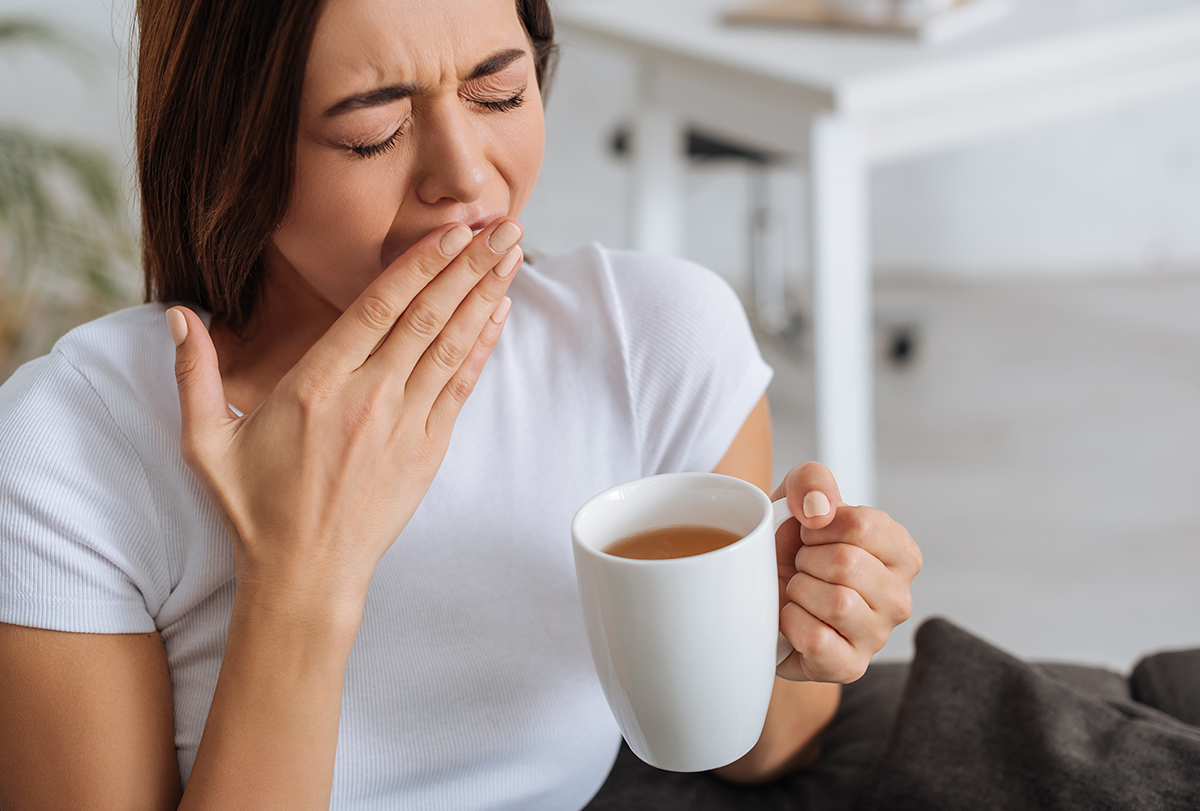
However, drowsiness during work, school, or other places can be troubling and bothersome. This can lead to difficulty meeting deadlines, inability to study, and trouble focusing on work. If such behavior continues, it can even put your studies and career in trouble.
This article will share some quick ways of dealing with drowsiness and functioning better during the daytime. (1)(2)
How to Avoid Drowsiness
Here are some tips that can help you manage and prevent drowsiness.
1. Be careful with your caffeine consumption
If you feel lethargic and sleepy at work, having a cup of coffee may help you a lot. A caffeine shot can boost your energy and make you feel awake, which is very helpful in getting you to a working condition.
Caffeine is a CNS stimulant, which means that it increases your brain activity and stimulates your nervous system. This leads to an improvement in your concentration, performance, and logical reasoning. It contributes to wakefulness and decreased drowsiness. (3)(4)
Note: You should not overdo caffeine consumption. Drinking way too much coffee can make you feel jittery and anxious. Your brain can be overstimulated, resulting in lowered productivity. Too much caffeine can also hinder your sleep cycle, making you even more tired in the morning. So, always drink in moderation. (5)
If you’re already a coffee drinker, you may need to cut it off. A group of experts from the Royal College of Psychiatrists advises that you cut off caffeine completely first for 3 weeks to a month to see if it helps with fighting the feeling of tiredness.
For some people, a sudden cut-off from caffeine can cause headaches. In such cases, you should lower your caffeine consumption gradually instead of going cold turkey.
If limiting or giving up caffeine helps with your drowsiness, then you may keep it that way to stay energetic.
2. Nap a little
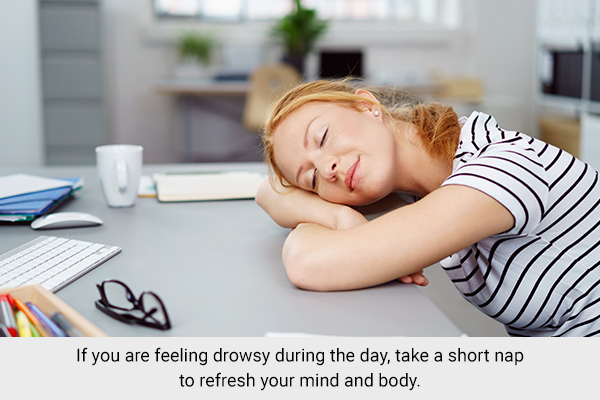
A quick little nap won’t hurt anybody. Taking a nap can be a way to beat feeling drowsy during the day.
If you’re at work, try to sleep for 10–15 minutes during your lunch break. You can always just put your head on the desk and get a shut-eye, or you can quietly relax in the break room if that’s an option. A power nap like this will prepare you to do work when you feel full of energy again. (6)
If you’re scared that you’ll oversleep, then ask a friend to wake you up or set an alarm.
3. Walk around
When you’re feeling drowsy, staying in one spot or sitting for a long duration can make it even worse. The solution is getting up from your desk and being active. Walk around in the office or go to a nearby ground/ park. (7)
You can also do some desk exercises such as stretching. Instead of calling or mailing, try to walk over to the person’s desk to talk. Take your calls while pacing through the room or in the corridor.
Getting some physical activity done energizes the body and helps you stay awake. It also helps you concentrate better on your work.
4. Put on some music
Being in the quiet will make you feel even more drowsy. It will cause you to feel like lying down and falling asleep. To avoid this from happening, try listening to good music. Put in your headphones and enjoy some good beats. (8)
Don’t listen to something slow and soothing as it might make you sleepier. If you want to awaken your brain, upbeat tunes are the answer.
Make sure this does not interfere with your daily routine and work. Also, keep the volume down if you don’t have earphones and take permission from those around you.
5. Don’t eat a heavy meal
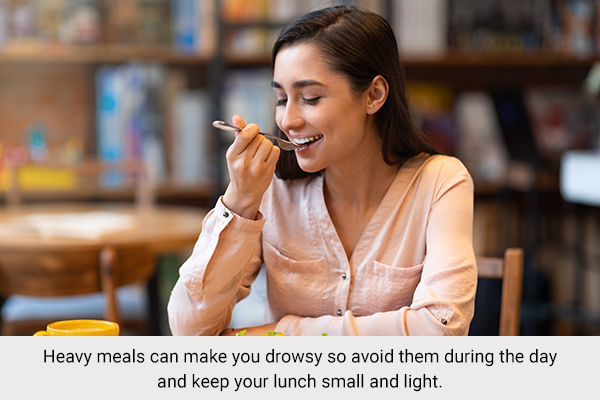
Eating heavy meals contributes to the feeling of drowsiness. So, avoid eating too much or bigger meals during your lunch break. Try to stay away from sugar-filled foods and beverages.
Also, avoid carbs. Instead, eat a light lunch and a small snack. Munch on some nuts, eat fruits, and have beverages such as buttermilk or coconut water instead of colas and sodas. (9)
It is important to satisfy your appetite but don’t overeat. A good light lunch will include vegetables, salad, eggs, and whole grains.
6. Lighten up the room
It is important to let the light in to feel awake and focused. Try to keep the windows open and don’t close the blinds. This will let in natural light, and the sun would do you good if you feel drowsy. Sunlight is known to increase your energy levels. (10)
If you work in a basement or if the windows don’t open, then use lamps and keep your workstation well lit. Light increases wakefulness and ensures your sleep-wake cycle is not hindered or disturbed. (11)
7. Wash your face
If staying awake is an issue you’re facing nowadays, try to splash some water on your face every few hours. This will lighten you up and give you some much-needed energy.
You can also keep some wet wipes with you to use in case going to the washroom every other hour is an issue. (12)
8. Keep the room cool
Make sure the fans around your workstation are always on to help you stay active. Drowsiness can be fought if you have a fan directly blowing air to your face. If it’s cool outside, open the windows and let the breeze in for you to enjoy the cold winds. (13)
This will help you stay active and keep your eyes open. You’ll feel fresh and ready to work instead of wanting to sleep.
9. Keep yourself busy
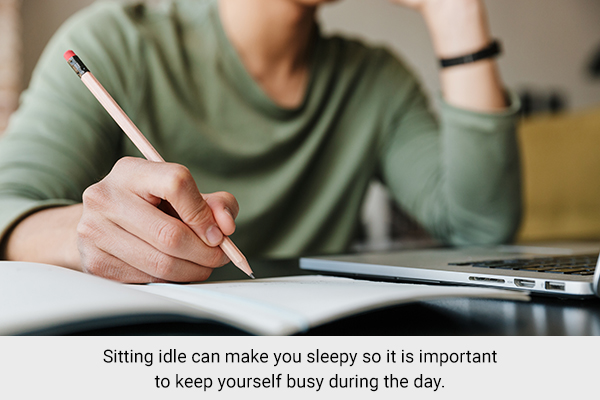
Having nothing to do will encourage you to fall asleep. So, it is important to stay busy. Try to focus on your work. If you have already done the day’s deeds, then pre-plan future tasks. (14)
Also, you can take up a hobby, start journaling, keep a diary, or read a book. This not only keeps you from being drowsy and lethargic but also promotes good mental health. (15)
You can also help someone else with their work and take up some lighter responsibilities that will keep you engaged in something. An active lifestyle also ensures a good night’s sleep.
10. Munch on something
When you start to have light lunches and smaller meals, you might get hungry in between. To combat this, have low-sugar snacks. This also ensures your blood sugar levels are balanced, which means a balanced life with sufficient energy. (16)
You can munch on cut veggies, eat a handful of dry fruits, or try fresh yogurt or some whole-wheat crackers.
11. Start a conversation
Another way of keeping yourself energetic and alert is to engage with those around you. Socialize at work, talk to friends, or chat with a loved one. Talking is a good stimulator for your brain.
You can even involve yourself in professional discussions and be more active during meetings. (17)
12. Do breathing exercises
Breathing is known to stimulate a good flow of blood to your entire body. It lowers your heart rate and improves your mental performance. It also keeps your energy levels high. (18)
The good news about breathing exercises is that you can do them anytime, anywhere, even at work at your desk. It is simple – just keep your hand on your stomach and your other hand on your chest as you inhale and exhale deeply.
Meditation and yoga are other ways of staying alert. (19)
13. Always stay hydrated
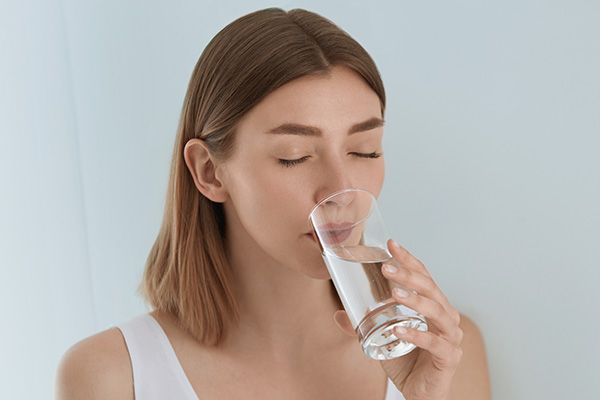
Water is an important nutrient and sufficient hydration is vital for optimal everyday functioning.
Studies have shown that even mild dehydration can impair cognitive and physical performance. As the severity of dehydration increases, physical performance decreases. So, to fight fatigue, proper water intake is a must. Adults should consume 2.5–3 liters of water every day. (20)
When to See a Doctor
If you start sleeping in the middle of work and are not able to stay up, then it is a sign to see a doctor and seek medical help. This type of increased drowsiness is often termed narcolepsy, which is a sleep disorder.
You may need to take medicines or engage in behavioral therapy to make sure your sleep-wake cycle is restored.
A doctor will evaluate you for the following causes of tiredness:
- Psychological causes
- Lifestyle causes
- Physical causes
Most-Asked Questions About Drowsiness
Does a good night’s sleep help to avoid drowsiness?
Not being able to fall asleep at night can be a culprit in keeping you low on energy during the day. To avoid this from happening, ensure you get around 7 hours of sleep every night.
If you are unable to fall asleep, try to meditate before bed or listen to a calming tune. If this happens regularly, go to a doctor for medical attention. (21)
What causes daytime drowsiness?
Several factors can contribute to your feeling drowsy during the day. (22)(23) These include:
- Sleep apnea
- Sleep deprivation
- Side effects of medicines
- Depression
- Anxiety
- Obesity
- Chronic pain
- Hypothyroidism
- Anemia
- Various professions and duties (People who are allotted night shifts have an impaired sleep cycle and oftentimes suffer from daytime drowsiness. This is more likely to happen when the schedule of the shifts is not constant and keeps changing.)
How does drowsiness during the daytime make driving dangerous?
Drowsy driving is a huge problem in the United States. Falling asleep while you are driving is associated with increased levels of risk.
Even if you are not fully asleep and only feeling sleepy, it will affect your ability to drive safely. This is because drowsiness can make you not pay enough attention on the road.
Also, a slow reaction time will affect your decision-making skills as you may break or steer suddenly. Around 6,000 fatal car accidents every year may be due to drowsy driving. (24)
Final Word
It is extremely important to manage drowsiness when it starts to hinder your quality of life.
It can be very hard to do daily chores and other activities if you’re continuously sleepy. You may start having trouble at work, school, and social events. You will be unable to enjoy life if it goes on for a long time.
It is important to get professional help if daytime drowsiness does not get better as it may be due to a serious underlying disease that would require immediate attention. The measures shared above are just small steps toward managing work time drowsiness. You can try them out and see what works for you.
- Was this article helpful?
- YES, THANKS!NOT REALLY


